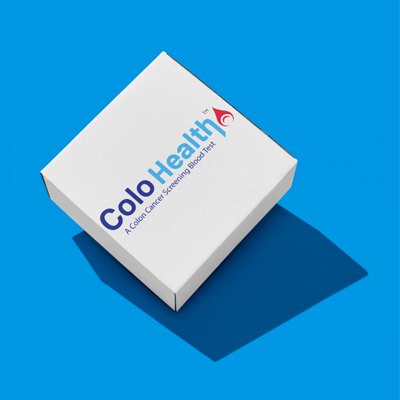ColoHealth
Step 2 of 3
The Best Test for Colorectal Cancer Screening is the one the Patient will do!
As a patient-accepted method of testing, a simple blood test for CRC screening is ideal.
$199.00
Out of stock
ColoHealth™ is intended for people over age 50 who are unable or unwilling to be screened by traditional colorectal cancer (CRC) screening methods, and who are at average risk for developing colorectal cancer*.
ColoHealth is an innovative blood test for colorectal cancer screening for patients unwilling or unable to be screened by other recommended methods.² The test detects mSEPT9 DNA, a differential blood biomarker that is methylated in colorectal cancer.³
Data indicate this test may work for people under age 50. Consult your physician (4).
INDICATIONS FOR USE
The ColoHealth™ test is a qualitative in vitro diagnostic test for the detection of methylated Septin 9 DNA in EDTA plasma derived from patient whole blood specimens. Methylation of the target DNA sequence in the promoter region of the SEPT9 v2 transcript has been associated with the occurrence of colorectal cancer (CRC). The test uses a real-time polymerase chain reaction (PCR) with a fluorescent hydrolysis probe for the methylation-specific detection of the Septin 9 DNA target.
The ColoHealth™ test is indicated to screen adults of either sex, 50 years or older, defined as average risk for CRC, who have been offered and have a history of not completing CRC screening. Tests that are available and recommended in the USPSTF 2008 CRC screening guidelines should be offered and declined prior to offering the ColoHealth™ test. Patients with a positive ColoHealth™ test result should be referred for diagnostic colonoscopy. The ColoHealth™ test results should be used in combination with the physician’s assessment and individual risk factors in guiding patient management.
WARNINGS, LIMITATIONS, & PRECAUTIONS
The ColoHealth™ test is not intended to replace colorectal cancer screening tests that are recommended by appropriate guidelines (e.g., 2008 USPSTF guidelines) such as colonoscopy, sigmoidoscopy and high sensitivity fecal occult blood testing. The ColoHealth test is not intended for patients who are willing and able to undergo routine colorectal cancer screening tests that are recommended by appropriate guidelines.
The ColoHealth test is not intended for patients defined as having elevated risk for developing CRC based on previous history of colorectal polyps, CRC or related cancers, inflammatory bowel disease (IBD), chronic ulcerative colitis (CUC), Crohn's disease, familial adenomatous polyposis (FAP). People at higher risk also include those with a family history of CRC, particularly with two or more first degree relatives with CRC, or one or more first degree relative(s) less than 50 years of age with CRC.
The ColoHealth test has not been evaluated in patients who have been diagnosed with a relevant familial (hereditary) cancer syndrome, such as non-polyposis colorectal cancer (HNPCC or Lynch Syndrome), Peutz-Jeghers Syndrome, MYH-Associated Polyposis (MAP), Gardern's syndrome, Turcot's (or Crail's) syndrome, Cowden's syndrome, Juvenile Polyposis, Cronkhite-Canada syndrome, Neurofibromatosis, or Familial Hyperplastic Polyposis, or in patients with anorectal bleeding, hematochezia, or with known iron deficiency anemia.
REFERENCES
- American Cancer Society. Colorectal Cancer Facts & Figures 2020-2022. Atlanta, American Cancer Society; 2020.
- United States Preventive Services Task Force (USPSTF). Screening for colorectal cancer recommendations statement. Oct. 2008
- DeVos T et al. Circulating methylated SEPT9 DNA in plasma is a biomarker for colorectal cancer. Clin Chem. 2009, 55(7):1337-1346
Patient Information
| Are you 50 years of age or older? | Yes, No |
|---|---|
| Have you declined the recommended U.S. Preventive Services Task Force (USPSTF) colorectal cancer (CRC) screening methods such as fecal tests, sigmoidoscopy, and/or colonoscopy? | Yes, No |
| Have any of your close relatives (parent, sibling, child) been diagnosed with CRC, precancerous polyps or hereditary colorectal cancer syndromes such as familial adenomatous polyposis (FAP) or Lynch syndrome? | Yes, No |
| Do you have a history of CRC, polyps, inflammatory bowel disease, or hereditary CRC syndromes? | Yes, No |
| Are you having any of the following symptoms: A change in bowel habits including diarrhea, constipation, or narrowing of stool that persists over a couple of days. Constant changing in bowel habits – e.g., feeling like there is bowel movement that is not relieved by passing stool. Rectal bleeding with visible red blood. Blood in the stool, which can change the appearance of stool to look dark brown or black. Abdominal cramping or pain. Weakness and fatigue. Inexplicable weight loss. | Yes, No |


